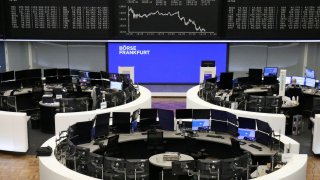
- Markets remain closely attuned to developments in Ukraine and prospects for central bank policy around the world in the face of surging inflation.
- The European Commission on Tuesday proposed banning Russian coal.
LONDON — European markets closed mixed on Tuesday as global investors focused on the Ukraine-Russia conflict and economic indicators.
The pan-European Stoxx 600 finished flat, while utilities added 2% and construction and material stocks dropped 1.8%.
In terms of individual share price movement, Vestas Wind Systems jumped 8.6% after Credit Suisse double upgraded the stock to "outperform" from "underperform" on the back of its shift away from fossil fuels.
At the bottom of the European blue chip index, electronics company ams Osram fell 8.4% after outlining its new strategy at its capital markets day.
Markets remain closely attuned to developments in Ukraine and prospects for central bank policy around the world in the face of surging inflation.
The United States and Europe are considering new punitive sanctions against Russia after allegations of civilian killings in Ukraine, with Ukrainian President Volodymyr Zelenskyy warning that more deaths are likely to be discovered in the towns recaptured from Russian forces. The European Commission on Tuesday proposed banning Russian coal.
Money Report
The U.S. is also expected to ask the U.N. General Assembly to suspend Russia from the Human Rights Council, U.S. Ambassador Linda Thomas-Greenfield said on Monday, after images emerged on Sunday of civilian bodies lining the streets in the recaptured town of Bucha, on the outskirts of Kyiv.
On Wall Street, the S&P 500 dipped on Tuesday as traders assessed the Federal Reserve's next move and whether the U.S. is headed eventually into a recession.
Chris Watling, CEO of Longview Economics, told CNBC on Tuesday that there is still scope for strategic risk-on sentiment in stocks.
"Markets are forward-looking, and that's what we've seen over the course of the first quarter — markets discounted heavy amounts of uncertainty, particularly in relation to the Russia-Ukrainian situation as we got into early March, but also in terms of what the (U.S. Federal Reserve) is up to," he said.
"By the time we got to late February, early March, there was an awful lot of uncertainty priced in, our technical models were all screaming 'buy' in some of the strongest buy signals from a tactical basis that we've had for a long time."
Watling argued that any potential recession is still not imminent, while economies and earnings are still growing and monetary policy is still loose enough that investors should stay long on stocks for now.
On the data front, the final composite euro zone PMI reading showed the bloc's economic activity dropped to 54.9 in March from 55.5 in February, but still came in slightly ahead of consensus estimates.
Subscribe to CNBC PRO for exclusive insights and analysis, and live business day programming from around the world.






